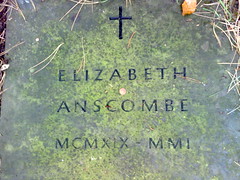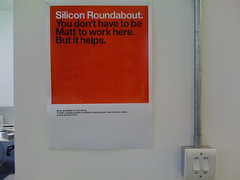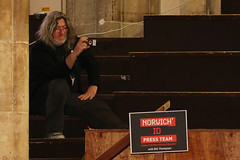I was at the Open University (Walton Hall, Milton Keynes) on Thursday and Friday for Relive 08, a conference on the educational use of virtual worlds. I took part in a panel debate on the Friday morning, and here I am with Ted Castronova, Roo Reynolds, Claudia L’Amoureux and Ren Reynolds. A fun time was had by all…
Ties that bind
[As ever, you can read this on the BBC News website]
One of the throwaway remarks I sometimes make at conferences is that “Google knows you’re pregnant before you do”.
I can say this because the things you search for will change as your life changes, and search engine providers may well be able to spot the significance of these changes because they aggregate data from millions of people.
Now Google’s philanthropic arm, google.org, has shown just what it can do with the data it gathers from us all by offering to predict where ‘flu outbreaks will take place in the USA.
It has found that “certain search terms are good indicators of flu activity”, in that they correlate well with reports from the official Centers for Disease Control and Prevention.
Elizabeth Anscombe’s grave
Wandering through a damp Cambridge yesterday I made my way to St Giles’ Cemetery (as was, it’s called something else now) to visit Wittgenstein’s grave, and also to call on Anscombe, buried nearby. An important philosopher in many ways, she was also Wittegenstein’s translator.
I remember her lectures from my undergraduate days.
Wired for a cause
[As ever, you can read this on the BBC News website too]
By the time you read this we may well know who is to be the next President of the United States, [indeed we do, and the result has given us hope] hanging chads, voter challenges and defective e-voting machines willing, although as I write both McCain and Obama are in the midst of their last minute campaigning.
Here in the UK media interest in the election has been intense, reflecting the fact that the outcome matters enormously to those of us without votes or influence.
Tyneside Cinema in Newcastle is planning to keep its media lounge open for election night, and some of my more politically oriented friends – the wonks rather than the geeks – have an all-night session arranged at a local pub.
Who is responsible in our cloudy world?
[As ever, this is also on the BBC News website]
In the next few days [in fact it is now published] a number of large technology companies, including Google, Microsoft and Yahoo!, are going to announce that they have signed up to a voluntary code of conduct on how they do business in countries that curtail freedom of expression like China and Singapore.
The code has been drawn up by the Washington-based digital rights group The Center for Democracy & Technology and a non-profit in San Francisco, Business for Social Responsibility, and it is believed to address the terms of business companies should adhere too and also to call on them to try to ensure that suppliers and business partners also sign up. Continue reading “Who is responsible in our cloudy world?”
Old Street and environs
Maybe you have to know them… but it made me laugh out loud.
Don’t have nightmares
[As ever you can read this on the BBC News website. Or on any of the spamblogs that rip off my copy and use it as linkbait.]
Anyone concerned about the security of their computers and the data held on them might sleep a little uneasily tonight.
Over the past few weeks we’ve heard reports of serious vulnerabilities in wireless networking and chip and pin readers, and seen how web browsers could fall victim to ‘clickjacking’ and trick us into inadvertently visiting fake websites.
The longstanding fear that malicious software might start infecting our mobile phones was given a boost when the Information Security Center at US university Georgia Tech outlined how phone software could be hijacked to create ‘botnets’ and allow handsets to be remotely controlled.
And now a group of researchers at the Security and Cryptography Laboratory at Ecole Polytechnique Federale de Lausanne in Switzerland have shown that you can read what is typed on a keyboard from twenty metres away.
The Weight of Data
[As ever, this is on the BBC News website too]
I have just deleted fifteen gigabytes of data from my laptop. Gone are the unwanted video clips, the duplicated photos, the filed columns and the unlistened-to music, all consigned to the great Trashcan in the sky.
Yet it weighs the same as it always did, just over 2 kilos to carry around with me from meeting to café to home every day.
And it’s still 2.75 cm thick even though it now contains significantly less debris.
When I clear out my paper files the recycling box rapidly fills up as my shelves are emptied of unwanted reports, old drafts of completed work and the rest of the detritus that accumulates around any freelance journalist.
And once I’m done the folders are thinner and lighter, offering me clear evidence of a job well done and rewarding me by the change in their physical aspect.
There are no such rewards for the assiduous hard drive cleaner, which is perhaps one of the reasons why it is so easy to live with a bulging mail inbox – it doesn’t actually bulge.
Norwich ID
I was one of the team leaders at the Norwich ID ‘Unconvention’ on Friday, working with a group of young people to report on what was happening on the day.
Between a rock and an interface
[Not my title – I think Mark is to thank. And you can read this on the BBC News site as always]
One of the most wonderful things about spending a lot of my day online is that there is always something interesting to read when work gets boring or I’m waiting for the coffee to brew.
And I don’t even have to go looking for things to read, as the Bloglines news aggregator brings the latest postings from the ninety-two websites I’m most interested in to one place, checking their RSS feeds and managing them for me.
All I have to do is skim through looking for anything that catches my eye and seems worth a little attention.




